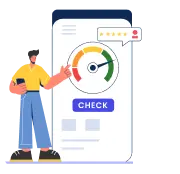To ensure the collection and distribution of credit information related to loan defaulters, the RBI launched a scheme in 1994. In the initial stages, RBI gathered information relating to those consumers who failed to repay the collective credit amount of Rs. 1 crore. However, five years later the benchmark debt amount was reduced to Rs. 25 lakh. The RBI has further classified by dividing the list of defaulters into two categories, named as wilful and non-wilful defaulters. It maintains a list of wilful defaulters who owe Rs. 25 lakh or more to any financial institution. Later, this list is publicly shared with all the financial institutions so they to make informed decisions before loan sanctioning.
TransUnion CIBIL does not maintain any defaulters list, nor does any Credit Bureau issue a defaulters list.
Whether you’re applying for a credit card or loan such as a home loan, car loan, or personal loan, your credit score is one of the few important factors that lenders check to assess your creditworthiness. A lender evaluates your loan repayment ability based on your credit report. If you have a bad CIBIL score then the lender might reject your loan application.
Paying your dues on time has a positive impact on your credit score. But if you do not make payment on time, defaults will be mentioned in the Days Past Due (DPD) section of your credit report. Due to this, your CIBIL score shall fall and lenders will refrain from approving your loan or credit card application. If you’re wondering whether your low credit score has put you on the ‘CIBIL Defaulters List’ then you must know that CIBIL does not maintain a defaulters list. No defaulters list is maintained by either CIBIL or any other credit bureau. Neither they can change or modify consumer details, as provided by the lending banks or NBFCs.
If you want to save yourself from being labelled as a ‘Defaulter’, you need to improve your credit score. To help you with the same, the following are some of the important points to remember:

Click to know your credit score @ zero fee. Check Now
Steps to Improve Your Credit Score
Regularly reviewing your credit report
Make sure you check your credit report for any errors regularly to stay updated with your credit score. If there’s a fall, you can track down the reasons and rebuild your credit score in time. If you find an error in the report, you may contact CIBIL through their website contact details.
Clearing off all your pending dues
Delayed loan repayment is one of the major reasons behind poor credit scores. A ‘settled’ or ‘written off’ status on a credit report warns lenders as it shows that the borrower cannot be trusted to fulfil their debt obligations. Therefore, loans for CIBIL defaulters are mostly rejected by lenders. To improve your credit report, clear off all outstanding dues as soon as possible. Once all your outstanding bills are cleared, check your credit report after three months or so to ensure the new status is reflected in your credit report.
Timely loan repayments
When you take a loan, you are required to repay a certain amount to the lender each month. Don’t be under the illusion that a single skip, delay, or partial payment will not affect your credit score as every single transaction of your payment is recorded and reported to the credit bureau. Missing or delaying even a single loan instalment negatively impacts your credit history and credit score.
If you want to improve your credit score or keep the good score steady, start paying your monthly loan payments and credit card bills before the due date. The more timely you pay your instalments; the higher will be your credit score.
Avoiding multiple loan applications in short duration
Never apply for multiple loans simultaneously or within a short period, as it depicts your credit-hungry behaviour. In addition, you should not apply for loans even for a short duration, as this behaviour raises suspicion about your creditworthiness and repayment capability. Therefore, you should apply for a loan or credit card one at a time. This not only increases your chances of getting your loan approved but also makes the payments easy to manage.

